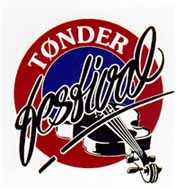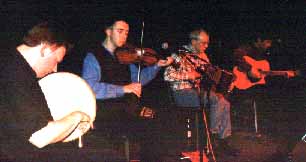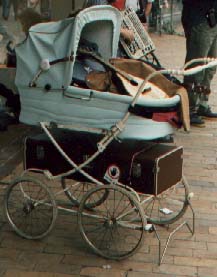FolkWorld article by The Mollis:
Folk Invasion
Traditional music is going strong in Denmark
Just imagine a festival with focus on Irish and Celtic music, where people start to queue for the best tickets already in the afternoon, 12 hours before the advance sale starts, where 20 000 of the 25 000 tickets on sale are sold already on the first day of the advance sale. And, still, the tickets are quite expensive...

This gives you already an idea of the popularity Irish Music enjoys currently in Denmark; the numbers above relating to the Tønder Festival in August. Tønder is going stronger and stronger each year. Thousands of young people come there to listen to- and to play music, to camp and to enjoy the special atmosphere. This festival is quite an institution in the Danish Irish Music scene says Svend Kjeldsen, one of the most important agents for Irish Music in Denmark, "The Tønder Festival has been doing a lot for Irish Music and for Celtic Music in general in Denmark, and in many ways the festival is responsible for the fact that a lot of Danes love this type of music. Tønder Festival is very close to celebrate its 25th anniversary (in 1999), and Carsten Panduro the festival director has done a lot for Irish music."
The Irish Music scene in Denmark today is quite powerful, being strongest in the two biggest cities, in Copenhagen and Aarhus. In Copenhagen the Irish Music scene has been on for a very long time, maybe 30 years – the concert and ballad scene as well as the instrumental and session scene. In Aarhus it's been about 15 years.
There are many very good players around in Denmark, and there is a strong session tradition in Denmark as well.
Both centres of Irish Music have their own favourite Irish Music bands – for Copenhagen it's Ashplant and Trad Lads – two Irish-Danish bands around bodhran player Martin O'Hare. For Aarhus it's RMA director and bodhrán player Svend Kjeldsen's Moving Cloud, playing nearly every weekend in bars, clubs and music places in Jutland.

Irish Music has not always been that strong in Denmark; thinks Svend, "there was a period where there was kind of a gap where young people wouldn't listen to Irish Music. The interest for Irish Music is coming in waves - there was a wave for folk music in the 70s, and there's a wave again now. At the moment there are many young people interested in Irish Music. And if you go to the sessions in Denmark these days, you will see a lot of young people, around 20-22 or something like that, that will come and play. They are bringing accordeons, fiddles and other melody-instruments related to Irish music. And they are learning the tunes before they go to the sessions, doing the hard home work. It's very promising right now."
This interest for folk music does not end with Irish Music, there is also a big revival of Danish traditional music. Alan Klitgaard, Danish musician, said in 1996: "A teenager on a city bike. A fiddle case slung over her shoulder. This is not a rare sight these days. And yet many of us remember a time when fiddles where carried around in guitar cases, not only because a guitar case could hold a change of underwear and a few bottles of beer, as well as the fiddle. (...) (Today) a new generation of musicians demonstrate their vitality (...)" There are quite a few cool young bands around playing Danish folk music; lively traditional music presented in a fresh and modern manner -Dug and Phoenix are just two examples of bands who are fairly successful in creating a new interest for Danish music.
 The club scene is getting better during the last few years; Alan Klitgaard: "The Danish club scene never really recovered from ist collapse in the late seventies, although it seems as if the number of clubs and small venues is on the rise again". For the two headquarters of Irish Music, in Copenhagen there's a couple of places where you can go and listen to a session during the week, as concert place there is to name the Copenhagen Folk Club. "In Aarhus the two main places would be the Færgekroen (In English:The Ferry Inn) in Skolegade 32 (the older one, there is a vocal/instrumental session every Sunday from 7 to 12 p.m. that has celebrated it's 15th session anniversary this June) and the Irish Bar Paddy go Easy in Aaboulevarden 60 (with an instrumental session every Sunday afternoon from 3 p.m. to 7 p.m.). There are several very good players around at both places.", recommends Svend. And then there are regular concerts with famous Irish acts in places like the Aarhus Kongreshus and clubs like Glazzhuset and Train.
The club scene is getting better during the last few years; Alan Klitgaard: "The Danish club scene never really recovered from ist collapse in the late seventies, although it seems as if the number of clubs and small venues is on the rise again". For the two headquarters of Irish Music, in Copenhagen there's a couple of places where you can go and listen to a session during the week, as concert place there is to name the Copenhagen Folk Club. "In Aarhus the two main places would be the Færgekroen (In English:The Ferry Inn) in Skolegade 32 (the older one, there is a vocal/instrumental session every Sunday from 7 to 12 p.m. that has celebrated it's 15th session anniversary this June) and the Irish Bar Paddy go Easy in Aaboulevarden 60 (with an instrumental session every Sunday afternoon from 3 p.m. to 7 p.m.). There are several very good players around at both places.", recommends Svend. And then there are regular concerts with famous Irish acts in places like the Aarhus Kongreshus and clubs like Glazzhuset and Train.
There are quite a few folk music festivals to recommend during the year. Tønder Festival with it's focus on Celtic Music is always the last weekend of August; the second biggest festival at Skagen in June has also quite a lot of Scandinavian music on. In autumn there is the old established Copenhagen Irish Festival, celebrating these days its 25th birthday. And there are lots of smaller festivals throughout the year.
Denmark is a popular touring country for Celtic musicians; they like the friendly atmosphere in Denmark, though some musicians told us, that sometimes the Danish drink a bit too much during the concerts so that the attention for the music drops. Still Denmark is a great place to go and enjoy Celtic music; try for a start the Tønder Festival, and you will definitely always come back!
Photo Credit: All photos by the Mollis
Svend Kjeldsen (left) with Errislannan
In FolkWorld's next issue will be a selection of Danish CDs reviewed - look out for it!
Some important addresses for folk music in Denmark where you can obtain further information:
- Roots Music Agency Denmark, Svend Kjeldsen, Christiansgade 29, 1. tv., DK-8000 Aarhus; Tel & Fax +45-2014 5503 (agent; infos on Jutland, Fyn and the Aarhus Irish scene)
E-mail: rootsmusicagency@aarhus.mail.telia.com, Homepage
- Martin O`Hare, Selveje Allé 19, DK-2500 Valby; Tel +45-3645 0802; website: www.ashplant.dk (for information on Copenhagen Irish Festival, Copenhagen Folk Club and the Copenhagen Irish scene)
- The Danish Folk Council (FFS), Graven 25A, DK-8000 Aarhus C; tel +45-8676-1141; fax –1147 (the Danish folk music organisation; also editor of the Danish folk mag 'Folk&Musik i Danmark')
Back to the content of FolkWorld Articles & live reviews
To the content of FolkWorld online magazine Nr. 7
© The Mollis - Editors of FolkWorld; Published 12/98
All material published in FolkWorld is © The Author via FolkWorld. Storage for private use is allowed and welcome. Reviews and extracts of up to 200 words may be freely quoted and reproduced, if source and author are acknowledged. For any other reproduction please ask the Editors for permission.
FolkWorld - Home of European Music

Layout & Idea of FolkWorld © The Mollis - Editors of FolkWorld
 The club scene is getting better during the last few years; Alan Klitgaard: "The Danish club scene never really recovered from ist collapse in the late seventies, although it seems as if the number of clubs and small venues is on the rise again". For the two headquarters of Irish Music, in Copenhagen there's a couple of places where you can go and listen to a session during the week, as concert place there is to name the Copenhagen Folk Club. "In Aarhus the two main places would be the Færgekroen (In English:The Ferry Inn) in Skolegade 32 (the older one, there is a vocal/instrumental session every Sunday from 7 to 12 p.m. that has celebrated it's 15th session anniversary this June) and the Irish Bar Paddy go Easy in Aaboulevarden 60 (with an instrumental session every Sunday afternoon from 3 p.m. to 7 p.m.). There are several very good players around at both places.", recommends Svend. And then there are regular concerts with famous Irish acts in places like the Aarhus Kongreshus and clubs like Glazzhuset and Train.
The club scene is getting better during the last few years; Alan Klitgaard: "The Danish club scene never really recovered from ist collapse in the late seventies, although it seems as if the number of clubs and small venues is on the rise again". For the two headquarters of Irish Music, in Copenhagen there's a couple of places where you can go and listen to a session during the week, as concert place there is to name the Copenhagen Folk Club. "In Aarhus the two main places would be the Færgekroen (In English:The Ferry Inn) in Skolegade 32 (the older one, there is a vocal/instrumental session every Sunday from 7 to 12 p.m. that has celebrated it's 15th session anniversary this June) and the Irish Bar Paddy go Easy in Aaboulevarden 60 (with an instrumental session every Sunday afternoon from 3 p.m. to 7 p.m.). There are several very good players around at both places.", recommends Svend. And then there are regular concerts with famous Irish acts in places like the Aarhus Kongreshus and clubs like Glazzhuset and Train.

